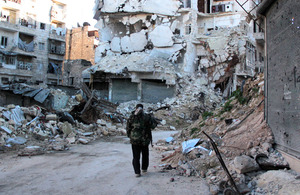Human Rights and Democracy Report 2012 - Iraq
Despite some progress in 2012, the human rights situation in Iraq remains difficult. However, there were some encouraging developments.

Aleppo, Karm al Jabal. This neighborhood is next to Al Bab and has been under siege for 6 months, 4 March 2013. Credit: Basma
Human rights in countries of concern - Iraq
Despite some progress in 2012, the human rights situation in Iraq remains difficult. However, there were some encouraging developments. The establishment in April of Iraq’s Independent Commission for Human Rights (ICHR), progress on a bill to combat domestic violence, ratification of the Convention on the Rights of Persons with Disabilities, agreement of an exemplary NGO law by the Kurdistan Regional Government (KRG) and growing engagement on women’s rights issues are all signs of movement in the right direction. Nevertheless, significant problems remain.
Iraq’s emerging civil society faces a number of challenges, including lack of training and expertise and the difficulties which non-governmental organisations face in obtaining registration. Iraq’s use of the death penalty increased dramatically during 2012, when 129 executions were carried out. Citizens continue to face difficulties gaining access to justice due to weak implementation of the law. Corruption remains endemic: Transparency International ranked Iraq 169 out of 176 in its 2012 Corruption Perception Index. Iraq’s diminished religious and ethnic minority communities remain vulnerable. In the Kurdistan region, several laws designed to improve the human rights situation have been passed, but the implementation of some of these laws, for example the Family Violence Bill, has been slow.
The promotion of human rights continued to be an important part of the UK’s Iraq Strategy, which was laid before Parliament in October 2012. Our priorities include supporting establishment of the ICHR, promoting women’s rights and encouraging Iraq to implement its National Action Plan for Human Rights. Progress on these was mixed. Despite commissioners being appointed in April, the ICHR is not yet fully operational. The National Strategy for Women’s Advancement is still in draft form after three years, although a number of women’s rights groups are now working steadily towards an implementation plan for UN Security Council Resolution 1325 on Women, Peace and Security. On 19 December, the Ministry of Human Rights (MoHR) announced an implementation strategy for its National Action Plan, which was drafted in response to the UN Human Rights Council’s Universal Periodic Review recommendations. We regularly raised human rights concerns with senior members of the government and encouraged them to take action to meet our concerns.
Our priorities for 2013 include supporting delivery of the National Action Plan. We will continue to support the UN and other partners to develop an action plan for implementing UN Security Council Resolution 1325 on Women, Peace and Security. Working through the EU and other partners, we will also support the development of the ICHR. We will continue to monitor the progress of legislation under consideration by the Council of Representatives, including the Freedom of Expression law and the draft Information Crimes law. We will also continue to provide training and funding for a variety of human rights projects across Iraq, with an emphasis on women’s rights, freedom of expression and the rule of law.
Further Information
Read and comment on the country of concern - Iraq in English
Read and comment on the Human Rights and Democracy Report 2012 in full in English